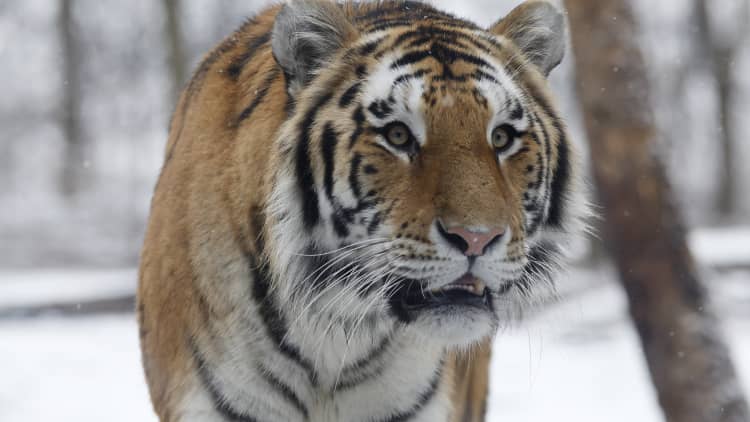As human telehealth visits are forecast to surge past 1 billion this year, the veterinary industry is following suit, at least for now, in order to reduce the spread of coronavirus.
On March 24 the U.S. Food and Drug Administration announced it would temporarily suspend a requirement for veterinarians to examine animals in person before beginning telemedicine in order to "limit human-to-human interaction and potential spread of COVID-19."
The decision came at a good time: On Wednesday the first cases of positive coronavirus tests in U.S. domestic pets, in two New York area cats, were confirmed, along with four more tigers and three lions at the Bronx Zoo. On April 6 the first tiger to test positive for the virus, at that same zoo, tested positive.
"During this time, we need to provide veterinarians with the latitude to expand the use of telemedicine in the care of animals, not only pets but also the animals that produce our food," FDA Commissioner Stephen Hahn said in a statement.
The measure, along with an April 30 extension of federal social distancing guidelines, has resulted in a widespread migration to virtual animal care.
"We've seen a significant uptick in telemedicine," said Dr. Aaron Smiley, president of the Indiana Veterinary Medical Association. "Veterinarians in Indiana and a lot of other states are essential businesses. We keep going to work, but our patients can largely stay home."
Smiley offers his services through telehealth platform Medici, which saw overall veterinarian registration for telemedicine spike by 48% in March, according to a company statement to CNBC. Its pet telehealth consultations also rose by 170% month over month.
VCA Animal Hospitals, owned by Mars Petcare, recently launched video consultations in addition to implementing cleaning and social distancing protocols at its facilities. A company spokesman told CNBC that use of its mobile app's live chat service with a team of on-call veterinarians has more than doubled during the pandemic. "So far, clients love it and the feedback from our veterinarians has been very positive," the spokesman said.
Mobile telehealth apps serve as a platform for vets to decide whether in-person treatment is essential for a pet. Practitioners can conduct video calls, examine photos and videos uploaded by pet owners and even facilitate electronic prescriptions and payments.
If a provider determines that a pet requires emergency medical services, the owner can bring it to an animal care facility — many of which are implementing new social distancing efforts.
"We have asked that patients are handed off to our staff from the hospital parking lot or at the front door whenever possible," the VCA spokesman said. "Retrieval of pets from the outside of the building presents an additional area of risk to control so that pets do not get loose and are properly identified."
For patients, a service fee is generally added to the primary costs set by the veterinary practice. A portion of the fee goes to the doctors, while the rest compensates the telehealth company providing the technology, according to the American Veterinary Medical Association's website.
The AMVA also provides examples of how vets can price their services for patients and recommends that vets inquire about telehealth expenses directly with service providers.
Pet telehealth lagged before the crisis
Smiley said he thinks it will be a "very smooth transition" for veterinarians to incorporate telemedicine into their practice.
VCA also predicted that veterinarians and clients alike will appreciate the convenience and accessibility of telehealth. "As with any new technology some practitioners will be more willing to adapt to the new possibilities than others," the company spokesman said, "but we believe the industry is ready to embrace more widespread use of telehealth."
Just months before the U.S. coronavirus outbreak, research concluded that veterinarians were behind in telemedicine practices.
A December 2019 study of 76 veterinarians, published in medical journal BMC Veterinary Research, found "a lack of both knowledge of the telehealth and telemedicine and its utilization among veterinarians surveyed."
"These findings stress the need for interventions both in veterinary school and continuing education programs to increase awareness of telehealth and its potential benefits in veterinary practice," the study said.
Although the requirements to practice veterinary telehealth are relaxed for the moment, the FDA is uncertain how long it will last.
"Given the temporary nature of this policy, we plan to reassess it periodically and provide revision or withdrawal of this guidance as necessary," the guidance policy stated.
States modify pet telehealth regulations
In 2020, veterinary associations in two states — Washington and New York — have partnered with software companies specializing in telemedicine. The New York State Veterinary Medical Society named TeleTails its exclusive virtual care platform in January, while the Washington State Veterinary Medical Association announced a deal with Petriage in April.
"As a result of the current situation we have seen states modifying their regulations to encourage greater use of telehealth services," a VCA spokesman said, "and we think this will continue in the future thanks to the benefits that telehealth brings."
Washington's Veterinary Board of Governors is expected to issue guidance on telemedicine requirements as well as "continuing education credits, supervision and tasks for veterinary technicians and staff, and dispensing prescriptions."
The FDA's loosening of telehealth requirements has "little impact" on New York since they are part of the state's guidelines and not written into law, according to the NYSVMS website. The association created a podcast detailing what constitutes veterinary malpractice and misconduct in the state.

While the FDA policy was intended to prevent the virus from spreading between humans, experts are unsure whether animals are a source of infection, although cats, dogs and even a tiger have tested positive.
The World Health Organization, which is investigating the animal outbreaks, says on its website that "there is a possibility for some animals to become infected through close contact with infected humans. Further evidence is needed to understand if animals and pets can spread the disease."
A study published in Science Magazine found that cats and ferrets were "permissive to infection." The authors did not respond to CNBC's request for comment.
The AVMA recommends that those sick with the virus limit contact with pets and other animals, although the group says there is "no reason at this time" to believe pets could be a source of infection. "It appears that dogs and cats are not readily infected with SARS-CoV-2, we have little to no evidence that they become ill, and no evidence that those that may be naturally infected spread SARS-CoV-2 to other pets or people," the AVMA says on its website.
On Wednesday, the first cases of positive coronavirus tests in U.S. pets, in two New York area cats, were confirmed.
Although the origin of the coronavirus has not been established, similar viruses such as the SARS epidemic have been traced back to bats, according to the CDC. One leading COVID-19 theory is that it spread from live animals to humans at a "wet market" in Wuhan, China where wild animals are sold live.
The virus is believed to have been passed from another mammalian species to a human, known as "spillover" in virus science, but U.S. intelligence agencies are also examining the possibility that the virus emerged from a lab in Wuhan, China, that was conducting experiments on bats.
"It's a possibility, though not the most likely possibility," an official told NBC News.






